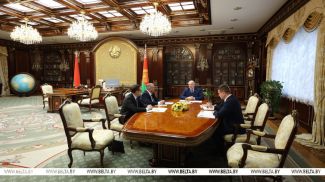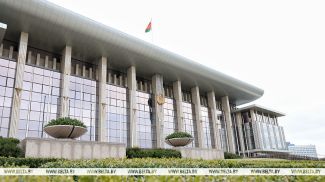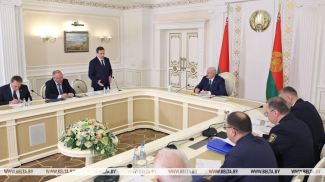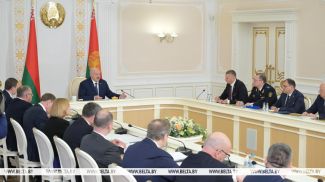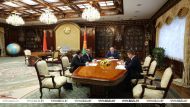MINSK, 18 May (BelTA) – Belarus and Ecuador need to take stock of their relations, Belarus President Alexander Lukashenko said as he met with Ecuador Minister of Foreign Affairs Maria Fernanda Espinosa Garces who is paying an official visit to Belarus on 17-19 May, BelTA has learned.
“There is a period in the Belarusian-Ecuadorian relations when we need to take stock of our relations, analyze our progress, maybe, stop some projects and determine an action plan for the near future,” the head of state said.
Alexander Lukashenko remarked that certain political reforms have been recently carried out in Ecuador, and they have not been completed yet. “I strongly hope that in this very important period, when working on this plan, you will also agree on top-level contacts with our minister. You should know that we are also happy to welcome your president in Belarus at any convenient time,” the Belarusian leader said.
The Belarusian-Ecuadorian relations and a corresponding roadmap should rely on the trade and economic cooperation. “I think we will focus on this in our plans. But agree that Belarus and Ecuador should not take obligations that we cannot fulfill. Therefore, we need to analyze our progress and previous plans,” the head of state said.
“However, we need comprehensive strategic plans for the future. We must do our best to diversify and raise our bilateral trade. The Belarusian-Ecuadorian friendship and partnership should rely on a solid foundation rather than on words. Therefore, I strongly hope for a real action plan for the future,” Alexander Lukashenko added.
The president stated that Belarus and Ecuador maintain good political relations. The countries have similar positions on the international agenda, efficiently cooperate in all international organizations, especially in the United Nations Organization. “We are ready to support your candidacy for the post of the president at the next session of the United Nations General Assembly (the Ecuadorian government has nominated the minister of foreign affairs for the post of the president at the 73rd session of the United Nations General Assembly. – BelTA's note),” the president said.
Alexander Lukashenko also remarked that any state, especially at a big geographical distance from its partners, is looking for the countries it can rely on in the cooperation with other countries of the region. “As a rule, these are the closest states. Ecuador is the closest state for Belarus in Latin America, and we are always trying to rely on Ecuador in the cooperation with other states,” he stressed.
Diplomatic relations between Belarus and Ecuador were established in May 1993. In 2014 the countries opened embassies. In June 2012 the Belarusian head of state paid an official visit to Ecuador, in October 2013 there was a visit of the Ecuador president to Belarus. Besides, the two leaders had a meeting during the 70th session of the United Nations General Assembly in New York in September 2015.
Interparliamentary ties are increasingly vibrant. In 2016 Belarus got an observer status in the Latin American Parliament (Parlatino).
There were two sessions of the Belarusian-Ecuadorian commission for trade and economic cooperation. The legal framework of bilateral relations includes six intergovernmental and ten interagency agreements. The sides are currently mulling over nine international agreements.
In 2017 the bilateral trade went up 90.5% thanks to the 43.2% increase in the import of Ecuadorian goods. Major exports are potash and nitrogen fertilizers, wires, oil products. Major imports are flowers and bananas. In January-March 2018 the bilateral trade made up $44.6 million (up 83% from the same period of 2017).
In 2017 the export of Belarusian services (mostly construction services) went up 88.5% to reach $10.2 million over 2016. The import of Ecuadorian services made up $8.3 million (up 79.5%).
The commodity destruction network in Ecuador includes affiliated companies of Belorusneft and Belzarubezhstroy. Extraction projects were among the most important projects for Belorusneft in Ecuador in 2017.
The countries are also developing scientific and humanitarian cooperation, have signed corresponding agreements.






